Two College Students Named Goldwater Scholars
Two students in the College of Arts & Sciences — Naomi Greenberg (C’24) and Roma Dhingra (C’24) — were named 2023 Goldwater Scholars.
Read 2023 Goldwater Scholars Story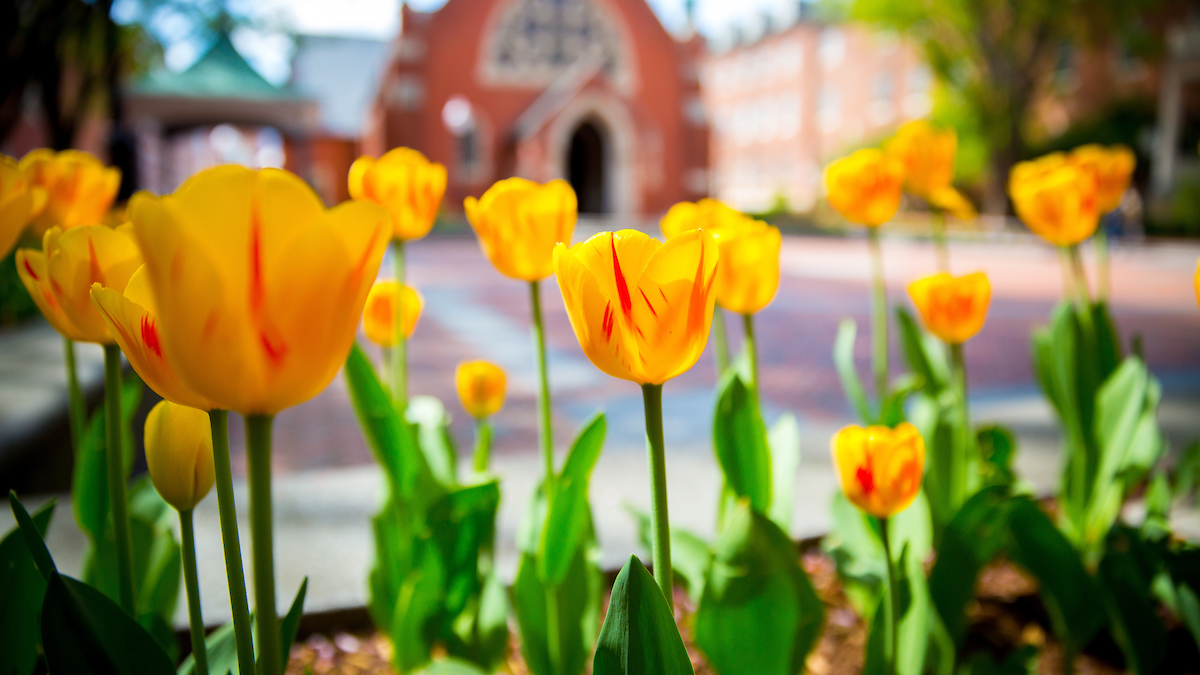
Four students in the College of Arts & Sciences were named 2024 Goldwater Scholars — Dua Mobin (C’25), Giselle Rasquinha (C’25), Morgan Rice (C’25) and Jonathan Riess (C’25).
One of the most prestigious awards for undergraduates in science, technology, engineering and math, the Goldwater Scholarship is given to support and cultivate the next generation of scientists, researchers and engineers. Established by Congress in 1986, the fund provides up to $7,500 to sophomores and juniors for up to two years.
“This is an indicator of the outstanding undergraduate research being done across majors here at Georgetown and how truly transformational the mentorship process is for applicants,” said Bill Cessato, deputy director of the Center for Research & Fellowships. “My colleagues and I congratulate the four recipients this year, their professors, and their mentors.”
This is the second time in the past three Goldwater application cycles that all four Georgetown nominees were selected for this honor.
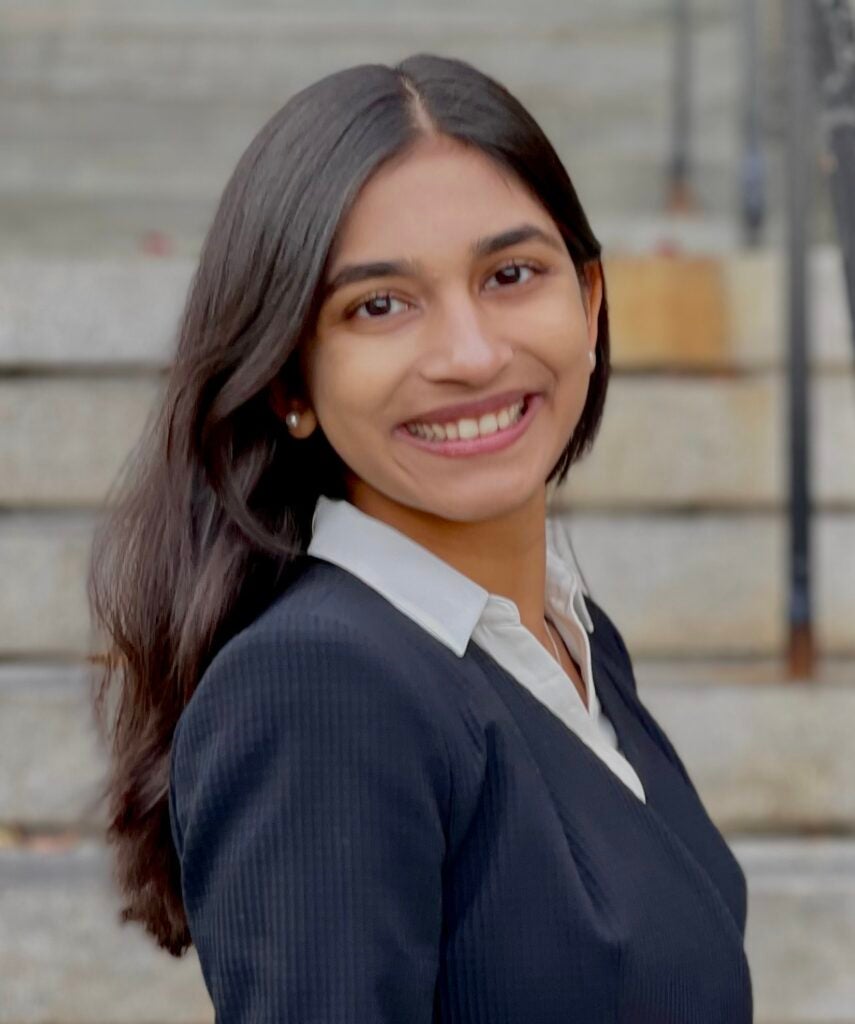
Dua Mobin (C’25), a double major in biology of global health and government.
Dua Mobin (C’25) is excited to pursue a medical career that bridges laboratory research, clinical application and healthcare policy to reach underserved minority populations. After finishing her studies at Georgetown, Mobin, a double major in biology of global health and government, hopes to become a physician-scientist.
“As a first-generation, low-income student my experiences with the medical system have shaped both my academic interests and professional aspirations,” Mobin said. “I plan to become a physician-scientist so that I can translate laboratory research into real-world treatments that cater to minority populations.”
Mobin, who’s Muslim, has visited clinics and doctor’s offices with family members from a young age and seen firsthand how disparities in the American healthcare system manifest.
“As a physician, I want to work with and serve patients from minority populations,” said Mobin. “As a scientist, I want those same clinical interactions to guide my laboratory research and potential novel treatments that can serve groups currently on the periphery of the medical system.”
Her life experiences inspire her to be a physician-scientist that integrates socioeconomic, religious and cultural factors into care and innovates treatments to meet the realities of underrepresented patients.
“I plan to pursue research in tumor biology that focuses on microscopy,” said Mobin. “I’m interested in creating therapeutics tailored to minorities, treating patients and advocating to implement new cancer treatments in underserved areas.”
On campus, Mobin is actively involved in both laboratory research and emergency care. As a research assistant in the Riggins Lab, housed within Georgetown’s Lombardi Comprehensive Cancer Center, Mobin studies the biophysics of cancer cell proliferation across underrepresented populations.
“During this upcoming year as a Goldwater Scholar, Dua will be studying how differences in the metabolism of amino acids may underlie health disparities in invasive lobular breast cancer,” said Rebecca Riggins, an associate professor of oncology in the School of Medicine. “Dua’s intellectual curiosity and passion for improving the lives of people with breast cancer in an inclusive way is a joy to see.”
Already, Mobin has worked with Riggins to study molecular markers that are overexpressed in certain populations and are associated with larger tumor size.
“My work in the Riggins Lab illustrates that treatment targeting cancers with specific genetic profiles may be more effective than the status quo,” said Mobin. “This research helps address health disparities by performing experiments to understand how the molecular underpinnings of cancer may differ across races.”
In addition to her research, Mobin has worked as Vice President of Diversity, Equity and Inclusion for Georgetown Emergency Response Medical Services (GERMS). Her time in GERMS has impacted how she views the patient-clinician relationship.
“During shifts, I see patients undergo some of their most vulnerable moments and am amazed
by their trust in their clinicians,” said Mobin. “Working as an EMT, I improved my clinical skills while administering life-saving medication, but I also learned to treat patients with the utmost empathy as I assist them during their most vulnerable moments.”
Her research, coursework and emergency care work have all combined to prepare Mobin for the next step.
“As I observe gaps in patient outcomes due to the lack of treatment available for minority populations, my research inspires me to pursue a medical career to both care for patients and use those interactions to guide my research, creating more effective treatments for patients from communities like the ones I came from.”
“Winning the Goldwater has been one of the biggest honors of my Georgetown experience,” Mobin said. “Coming to Georgetown, this was something that I never imagined I could have achieved. This would not be possible without the support and guidance of my mentors Adrian Kalaw (C’23), Rebecca Riggins, Heidi Elmendorf and Patrick Johnson.”
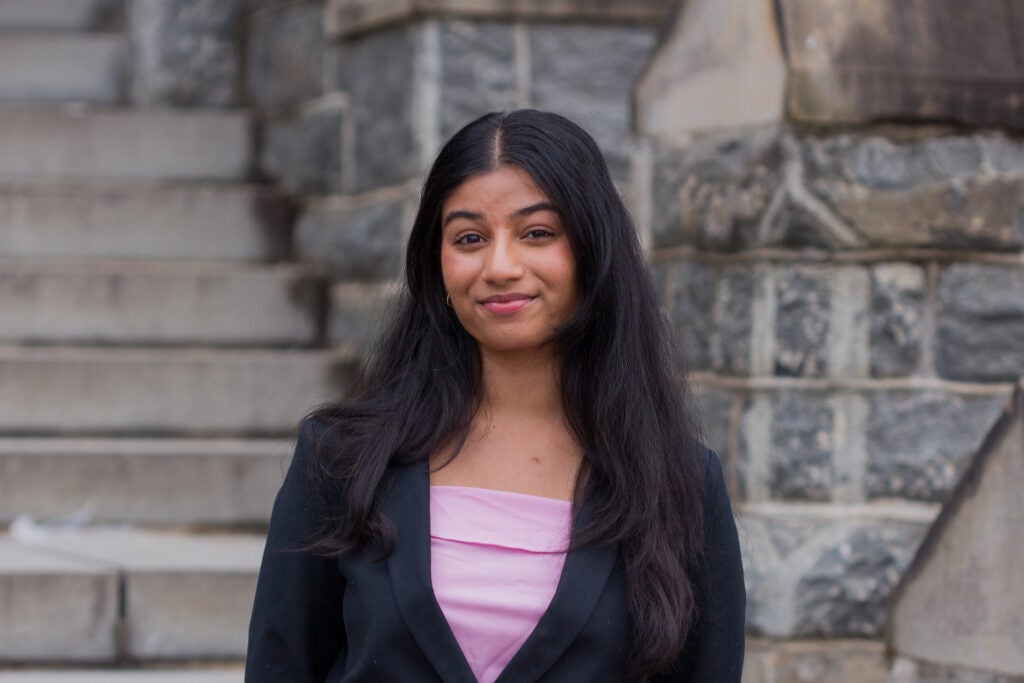
Giselle Rasquinha (C’25), a biology major.
Giselle Rasquinha (C’25) plans to use the award to continue pursuing research opportunities related to virology.
“My work has shown me that microscopic pathogens can shape the world in complex ways,” said Rasquinha, a biology major. “My ultimate career goal is to be at the forefront of understanding and eliminating persistent and re-emerging viruses.”
Last summer, Rasquinha worked in Dennis Ko’s lab, which is housed within the Duke University School of Medicine, investigating the relationship between genetics and susceptibility to the Zika virus. The virus, which is primarily spread by mosquitoes, can trigger autoimmune disorders and, when infected women are pregnant, can lead to birth defects.
“Although it is common knowledge that genetically diverse individuals can interact with pathogens differently, I had never applied this to my research before; it was incredible to be able to integrate this into my understanding of disease and infectivity,” said Rasquinha. “I am inspired by how our strategies for fighting disease can evolve with our progressive understanding of human diversity.
A global risk, the most severe outcomes associated with Zika virus outbreaks disproportionately affect those on the peripheries of society. For Rasquinha, pursuing research in virology carries an impetus to ensure equitable public health policies and outcomes.
“Foundationally, there seems to be a lack of scientific research that is inclusive of different demographics, such as failing to account for large discrepancies in disease rates in communities of color,” said Rasquinha.“I would like to conduct research that considers the biological and social diversity that may drive different disease outcomes for different populations.”
In addition to her work in Dennis Ko’s lab, Rasquinha has pursued research opportunities in the Casey Lab, which is housed within the Georgetown University Medical Center, and the New York Blood Center. With John Casey, an associate professor of microbiology & immunology in the School of Medicine, Giselle is working to develop therapies for the hepatitis delta virus, a liver disease caused by the eponymous viral infection.
“Based on her work in the lab, It is clear to me that Giselle has the scientific awareness, focus, commitment and perseverance necessary to succeed,” said Casey. “She consistently asks questions to make sure she understands the scientific and technical bases for our approach and follows up with more detailed probing questions about the underlying science.”
Outside of the classroom and the lab, Rasquinha has a passion for science communication, contributing articles to The Hoya’s science section. She served as the Georgetown delegate at the National Undergraduate Consortium for Science Journalism. Her ultimate aim is to pursue a dual M.D./Ph.D. and run her own lab.
“Disease is more than molecular biology; it is widely impacted by a variety of fields, including public health, medical practices and sociology,” said Rasquinha. “In a world where these disciplines are rapidly developing, I want to apply this diverse network of knowledge to the forefront of the fight against disease.”
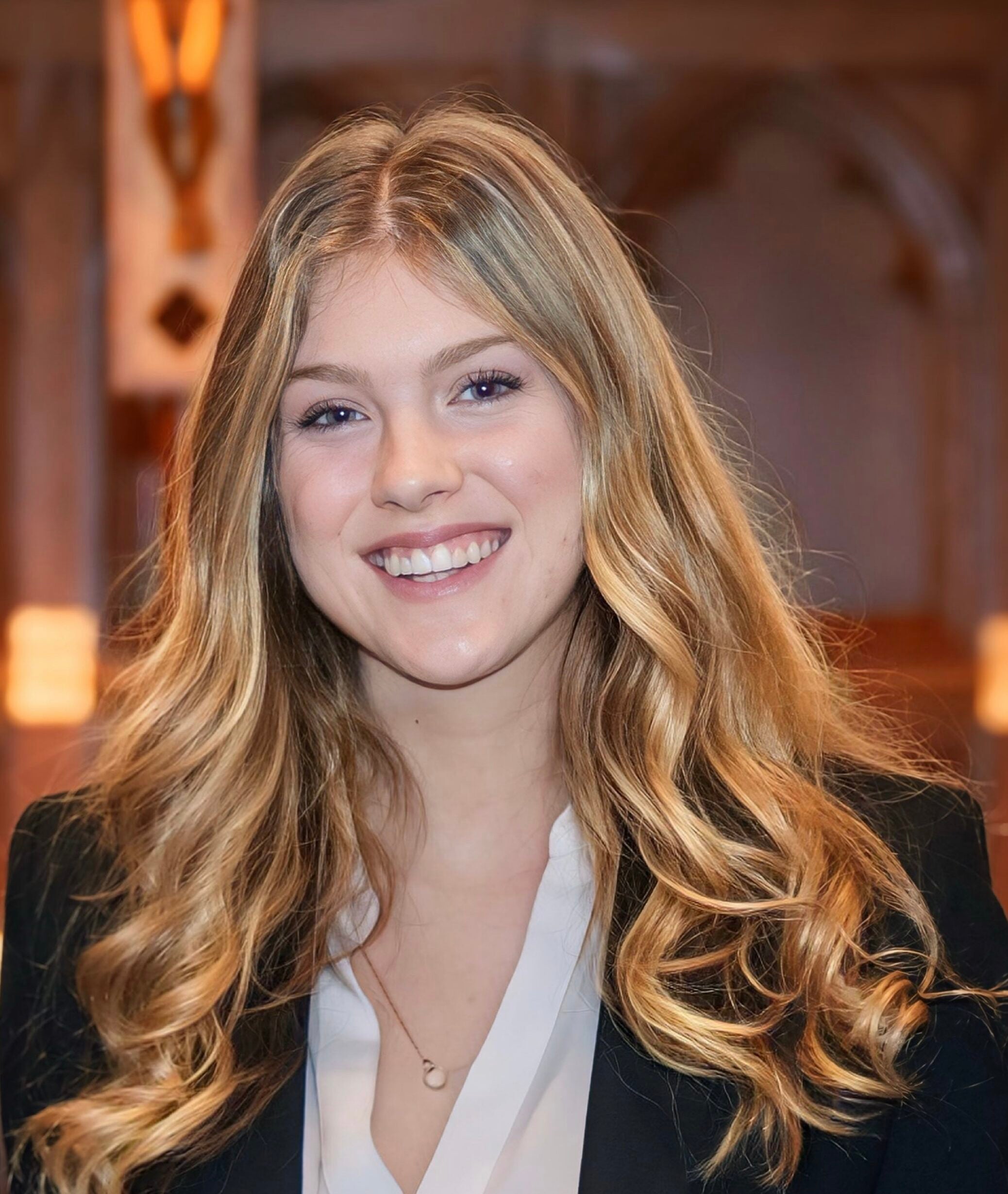
Morgan Rice (C’25), a biochemistry major.
Cancer researcher Morgan Rice (C’25) is excited to continue investigating metastasis in both laboratory and clinical settings.
“I am hoping to expand my research in order to better understand the mechanisms underlying cancer cell metastasis in an attempt to research new drugs that could inhibit pathways of metastasis,” said Rice, a biochemistry major. “By combining both clinical and research experience in the field of cancer, I will have a better understanding of the entire field of cancer biology,” said Rice.
After finishing her undergraduate degree at Georgetown, Rice hopes to pursue a dual M.D./Ph.D.
“All cancer treatments rely on both research and studies to prove that it will do what it’s intended for, and this is where the fields of M.D. and Ph.D, meet,” said Rice. “By receiving both degrees, it will allow me to be in the middle, working on clinical research while still being able to work directly with patients, and therefore allowing for a more expansive approach to research.”
On campus, Rice works as an undergraduate research assistant in the Braselmann Lab.
“I was drawn to the Braselmann lab for their work in live cell RNA imaging because it felt relevant to the medicine I was interested in,” said Rice. “I had previously learned about cellular dynamics and mechanisms in my science classes, but they were always very general and nonspecific when it came to irregular cellular processes.”
“I realized that the field of RNA dynamics overlaps significantly with cancer research, and I knew that by beginning my research career early, I could begin to build a project that would have an impact.”
Run by Esther Braselmann, the Clare Boothe Luce Assistant Professor in the Department of Chemistry, the lab’s team investigates biochemistry in living cells. Since joining the Braselmann lab, Rice has worked closely with graduate students and contributed to a peer-reviewed publication in Biophysical Reports.
“I have no doubt that Morgan has a bright future as a leader in research in front of her and I am delighted to follow her career in the years to come,” said Braselmann.
Last year, Rice received a Clare Boothe Luce scholarship, which is awarded to high-achieving undergraduate women pursuing degrees in science, math and engineering. This award helped fund her summer research with additional funds coming from the Center for Research & Fellowships’ Summer Mentored Undergraduate Research Fellowship.
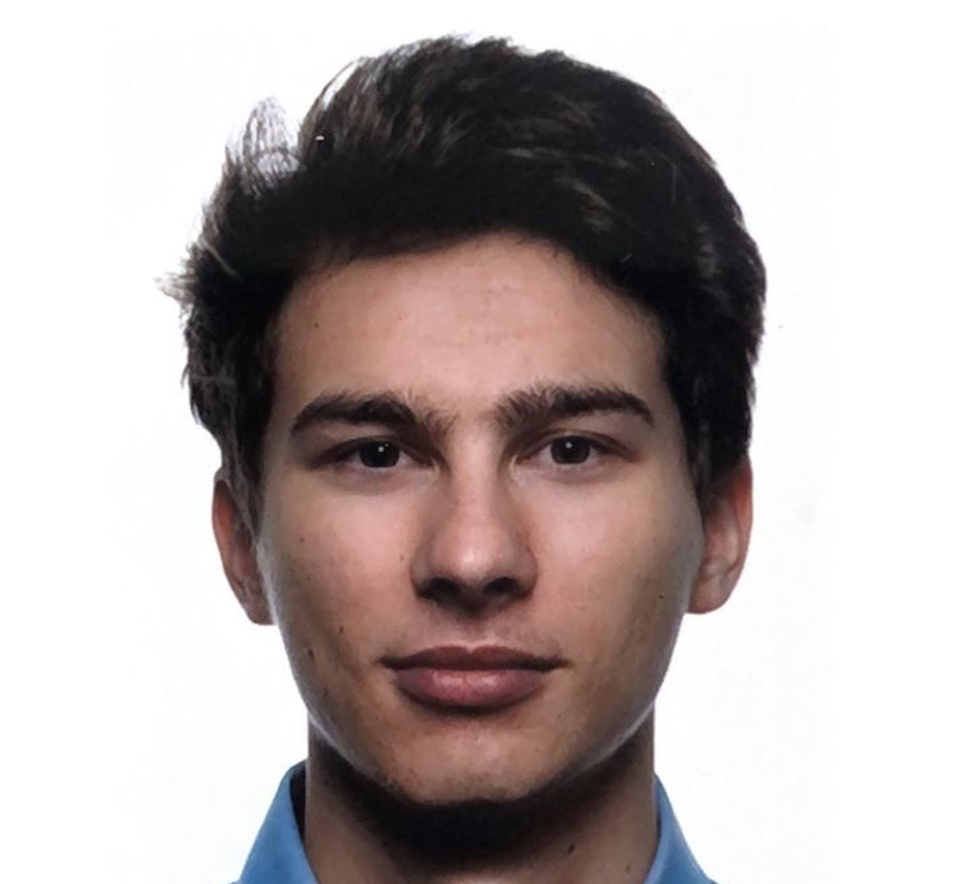
Jonathan Riess (C’25), a double major in physics and mathematics.
Jonathan Riess (C’25) is excited to continue exploring the fascinating world of mathematics and theoretical physics as a Goldwater Scholar.
“My research interests are holographic duality and string theory, using setups with extra dimensions to study physics beyond the Standard Model of particle physics, including quantum gravity and the string landscape, or nonperturbative phenomena in QCD,” said Riess. “I find these topics interesting because they are personally fulfilling and provide deep philosophical answers to questions about the origins and the fundamental constituents of the universe.”
Riess’ on-campus research journey started in the lab of Kai Liu, McDevitt Chair in Physics, where he worked on nanowire foams for submicron particulate filtration. These foams can be used in a variety of applications, such as face masks, and present a competitive, reusable and environmentally friendly alternative to current N95 masks. The research team was selected as a Phase 1 Winner and Phase 2 Finalist in the Mask Innovation Challenge.
“Jonathan helped us look into some novel applications of the foams”, said Liu. “It was fun having him on our team, and we continue to push forward in those research directions”.
Riess has also worked with Hovhannes Grigoryan, an adjunct professor in the Department of Physics. His research with Grigoryan focused on studying strongly interacting superconducting systems using methods from holographic duality and numerical simulations.
“Holographic duality allows us to study physical phenomena where our conventional methods fail by relating a theory that is relatively easy to study to a relatively difficult one,” said Riess. “It has a rather nice philosophical interpretation, telling us that there is not a unique perspective or description of nature, but rather many dual descriptions of reality.”
A double major in physics and mathematics, Riess has also worked with Matthias Eller, chair of the Department of Mathematics & Statistics. With Eller, Riess helped organize the Applied Mathematics Graduate Seminar, where he lectured on semigroups methods for solving partial differential equations. He has also worked closely with Der-Chen Chang, the McDevitt Chair in Mathematics and Computer Science, under whose supervision he plans on completing his undergraduate thesis.
Most recently, Riess has worked with Ragnar Stroberg, an assistant professor at the University of Notre Dame, in the area of theoretical nuclear physics. Together, they investigated potential issues with the Standard Model of particle physics, namely CKM Unitarity violations. With the support of Georgetown’s Department of Physics, Riess presented this research at one of largest nuclear physics conferences in the United States – the DNP-APS 2023 conference.
Rising sophomores (Class of 2027) and juniors (Class of 2026) interested in advising and applying for nomination for the Goldwater Scholarship should visit the Center for Research & Fellowships for details about the upcoming application cycle.
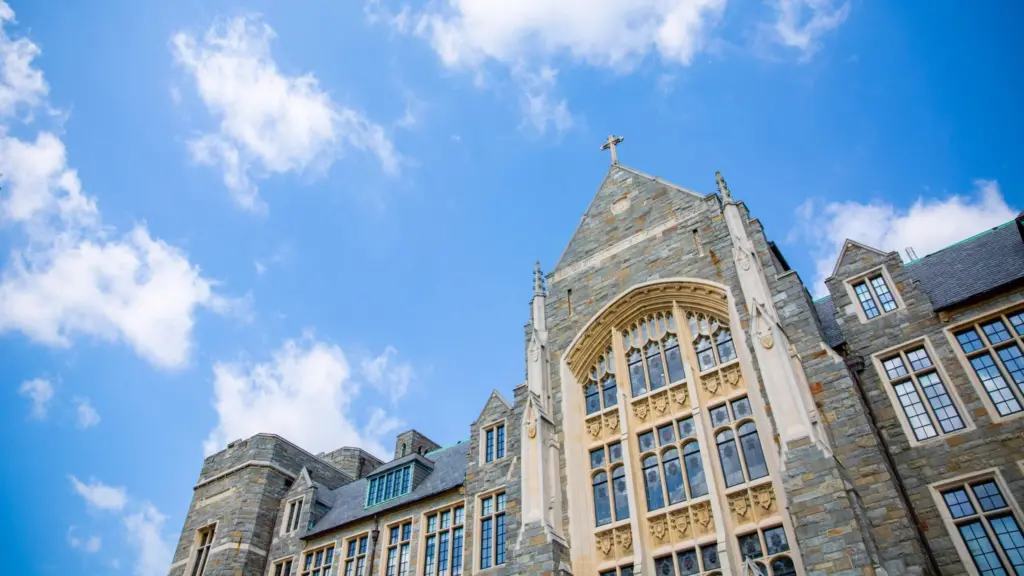
Two students in the College of Arts & Sciences — Naomi Greenberg (C’24) and Roma Dhingra (C’24) — were named 2023 Goldwater Scholars.
Read 2023 Goldwater Scholars Story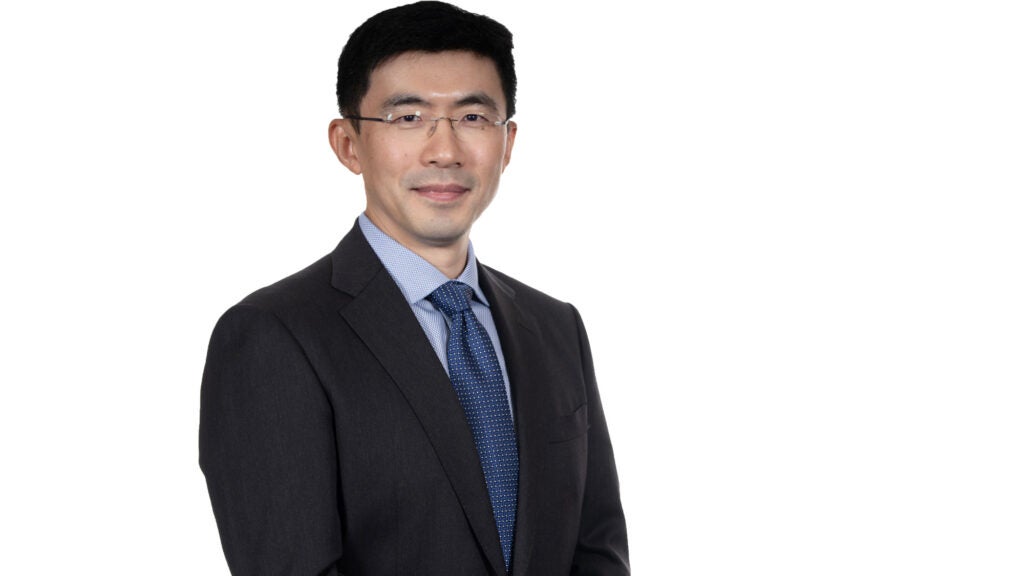
The National Academy of Inventors (NAI) has elected Kai Liu, a physicist and materials scientist, to its 2022 class of Fellows.
Read Full Story